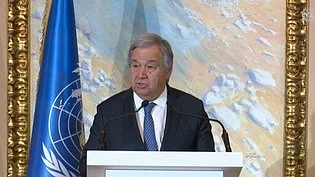World
UN chief condemns deadly Israeli attack on Gaza church
Benjamin Netanyahu says "Israel deeply regrets that a stray ammunition hit Gaza's Holy Family Church"

UN secretary-general Antonio Guterres strongly condemns the Israeli strike on the Holy Family Church in Gaza, a sanctuary for civilians, a UN spokeswoman said.
"Attacks on places of worship are unacceptable," said Stephanie Tremblay, associate spokesperson for the UN chief. "People seeking shelter must be respected and protected, not hit by strikes."
Too many lives have already been lost. The secretary-general calls on all parties to ensure that civilians are respected and protected at all times and allow humanitarian aid to flow into Gaza at scale, said Tremblay, adding that there is an urgent need for an immediate ceasefire and the immediate and unconditional release of all hostages, Xinhua news agency reported.
The UN office for the Coordination of Humanitarian Affairs (OCHA) said on Wednesday, 16 July, that Israeli strikes over the past 24 hours have hit sites hosting displaced Palestinians, with some of them injured and killed.
Meanwhile, Israel "deeply regrets" a bombing of Gaza's only Catholic church, Israeli Prime Minister Benjamin Netanyahu said, in an attack that killed three people and wounded at least 10 others.
In a statement, Netanyahu said the strike was caused by "stray ammunition" that hit the Holy Family Church, Xinhua news agency reported.
Published: undefined
"Every innocent life lost is a tragedy. We share the grief of the families and the faithful," he said.
In a post on social media platform X, the Israeli foreign ministry said the Israel Defense Forces was "examining this incident, the circumstances of which are still unclear."
It added that the results of the investigation would be published "transparently."
Between 8 and 15 July, according to OCHA, more than 11,600 people were newly displaced, bringing the overall displacement since the breakdown of the ceasefire on 18 March to more than 737,000 people, about 35 per cent of Gaza's population.
Since the outbreak of the war in Gaza 21 months ago, nearly everyone has been displaced, in many cases multiple times.
The office said that most housing in Gaza is flattened or otherwise uninhabitable, and many families stay out in the open. Meanwhile, many displaced people have been hesitant to bathe in the Mediterranean after Israeli authorities reinstated a ban on access to the sea along Gaza's coast, specifically prohibiting swimming and fishing.
For many, the sea has been their only option to wash, due to near-total collapse of water infrastructure, said OCHA. Fuel shortages continue, said OCHA, while the amounts of fuel that Israel allows into Gaza are still nowhere near enough to keep life-saving services running.
"There was a small but important step forward today: For the first time in more than 135 days, we were finally allowed to bring in some benzene, which powers ambulances and other critical services," the humanitarians said. "That's in addition to the limited amounts of diesel allowed over the past week."
However, OCHA called for more fuel, including both benzene and diesel, to enter Gaza regularly, as well as an immediate lifting of the ban on shelter materials. "Lives depend on both (fuel and shelter)," the humanitarians said.
Published: undefined
Follow us on: Facebook, Twitter, Google News, Instagram
Join our official telegram channel (@nationalherald) and stay updated with the latest headlines
Published: undefined